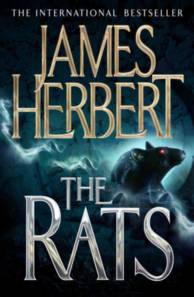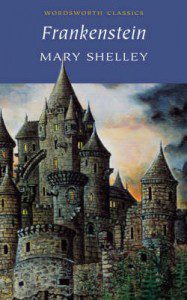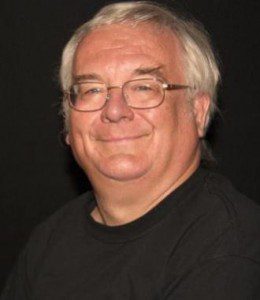Today is both St George’s Day and World Book Night. With that in mind, it seemed highly appropriate that we bring you this list of ten horror authors that have helped shape horror fiction into the joyous creation that we know and love today. It’s worth noting that this is neither an extensive nor a definitive list—but we do promise you this, reading these authors will be both a pleasure and an education in horror. Don’t forget to leave your thoughts and comments below. Let’s get started.
 10. Algernon Blackwood
10. Algernon Blackwood
It’s difficult to have a conversation about supernatural or weird fiction without mentioning Algernon Blackwood. His reputation is such that he was described by H.P. Lovecraft as one of the Modern Masters of supernatural horror and Indian-American literary critic, S.T. Joshi said of short story collection Incredible Adventures that it “may be the premier weird collection of this or any other century”. His life’s work includes a wide range of novels, plays, short story collections and his only non-fiction title, Episodes Before Thirty, a memoir of his youth.
Recommended reading: Ancient Sorceries and Other Weird Stories
9. David Moody
David Moody’s journey from bank manager to full-time writer is both a fascinating and inspirational story. He was one of the first genre writers to take advantage of the e-revolution, so much so that he was publishing online in 2001, years before the existence of Smashwords, Amazon Kindle, Goodreads and other companies and products that have been integral in ensuring the success of e-publishing. When Moody’s apocalyptic series, Autumn was put up for download on his website it received over half a million downloads. He also set up his own publishing house Infected Books before he was picked up by Thomas Dunne Books in 2008. There’s a strong case that Autumn led a zombie revival in fiction, with authors such as Wayne Simmons, Iain McKinnon and Craig DiLouie all following-on from Moody’s initial undead footsteps.
Recommended reading: Autumn
 8. Shaun Hutson
8. Shaun Hutson
Love him or hate him, it’s unlikely that you will have an indifferent reaction to the author that has brought us titles such as Slugs, Spawn, Necessary Evil and most recently, the novelisation of Twins of Evil. The famous Liverpool FC fan is one of the most famous pulp writers of the eighties, alongside Richard Laymon, Graham Masterton and Guy N Smith. If nothing else, one must admire his work-rate having consistently released one or two novels, almost every year since his debut in 1982. Whether writing fiction, non-fiction or in-person, Shaun does not mince his words. A straight-shooter and one of the most prolific pulp horror writers in the business today.
Recommended reading: Dying Words
7. Gary McMahon
Gary McMahon is one of the most exciting writers within genre fiction. Both The Concrete Grove and Dead Bad Things were amongst the best novels of last year. His novels are bleak, gritty and realistic. Yet they are never gratuitous and often the violence is underplayed which only adds to its impact. Short story, novel or somewhere in-between, McMahon’s writing is effective and compulsory.
Recommended reading: The Concrete Grove
 6. James Herbert
6. James Herbert
With the exception of Stephen King, James Herbert is possibly the most referenced influence from British authors within genre. Don’t believe us? Check out our Meet The Writer interviews and you’ll see Herbert’s name crop up again and-again, and not without good reason. A familiar recurring theme within his fiction is the end-of-the-world, apocalyptic, disaster scenario. Novels such as The Rats take the relatively mundane and turn them into life-changing, and threatening objects of concern! His fast-moving prose mean that nothing stays static for long—if action and violent deaths infused with the supernatural and suspense is what you’re after then trawl through Herbert’s extensive back catalogue.
Recommended reading: The Rats
5. Adam Nevill
There’s a fantastic group of modern supernatural literary fiction writers in England today and right at the forefront of this exciting movement is Pan Macmillan’s Adam Nevill. His meticulously crafted sentences and atmospheric stories make for some of the most unnerving and fear-inducing fiction since M.R. James. Whether it’s the cinematic The Ritual set deep in the Scandinavian forests or upmarket London’s Barrington House in Apartment 16, Nevill will scare you.
Recommended reading: The Ritual
 4. Mary Shelley
4. Mary Shelley
Shelley’s Frankenstein is one of the most effective horror stories of all-time in its themes, influence and legacy. Not only has it spawned many straight and off-the-wall adaptations, but it has influenced a whole host of authors and films including Dean Koontz’s popular reimagining set in New Orleans. Alongside Stoker’s Dracula there are few other stories that are quite as synonymous with classic horror as Shelley’s Frankenstein.
Recommended reading: Frankenstein
3. M. R. James
If you mention the words ‘ghost story’ in the company of aficionados of the subgenre, then Montague Rhodes James’ name will more often than not crop up time after time. This cloistered academic, a provost of King’s College, Cambridge, initially wrote ghost stories to entertain friends and choristers within his rooms on Christmas Eve. In many ways, he perfected the formula of the ghostly tale, and his collection of stories still stands up today, nearly a century after they were first written. Stories such as Oh, Whistle, And I’ll Come to You, My Lad and A Warning to the Curious steadily build upon layers of mounting dread, eliciting delicious thrills and shivers at their conclusion. For anyone wanting to receive a good education in the roots of the English Ghost Story, then reading James is absolutely essential.
Recommended reading: The Collected Ghost Stories of M. R. James
2. Clive Barker
If ever there was a writer who reinvigorated the horror genre in the mid-80s, then Clive Barker was the man. Here was a writer who could not only delineate the most visceral of horrors, but do so with a poetry and lyricism uncommon to the genre at the time. In the course of his career, he has bequeathed to us on one of the most memorable of ‘monsters’, Pinhead and his fellow Cenobites, which he also brought to the screen in Hellraiser. But Barker is much more than that: his blurring and transcendence of the boundaries of genre (urban fantasy/horror), allied to a startling inventiveness and limitless imagination, led to his two greatest creations: Weaveworld and Imajica.
Recommended reading: Books of Blood I – VI
 1. Ramsey Campbell
1. Ramsey Campbell
Campbell is consistently cited as one of the major influences on the British horror scene and is considered the UK’s best living genre writer. Almost every writer now working within the scene has in some way been directly affected and influenced by Campbell, and even today his writing still startles and delights in equal measure, and as powerfully as it did when he first burst onto the scene. In his turn, he introduced the world to writers of the calibre of fellow Liverpudlian Clive Barker, mentioned above, and he continues to encourage new genre writers today.
Recommended reading: Alone with the Horrors: The Great Short Fiction of Ramsey Campbell 1961 – 1991
MICHAEL WILSON
SIMON MARSHALL-JONES















19 comments
Skip to comment form
Excellent list, and a great starting point for those readers who want to read some of the classic authors and books… I’ve read something from every one of the authors (some, more than once) and consider David Moody one of the best out there…
Armand Rosamilia
Brilliant list, though I’d include Simon Kurt Unsworth.
I’d put Phil Rickman in there somewhere too.
Thanks so much for sharing this list. I felt small reading through it, having not read these masters, other than Barker. If Armand second’s the notion, than I obviously have some work to do in catching up.
-Jimmy
Surely we cannot omit M R James?
Okay, you didn’t. What a fool. Apologies…
Okay, in a bid to save face I’ll make this comment instead:
Surely we cannot omit Graham Masterton!
Erm, I think M. R. James was the provost of King’s College, Cambridge, not Oxford.
Author
Pete – you’re right and we’re glad you picked up on this deliberate error! We’re not blushing, honestly.
Danny – We gave Graham a namedrop in the Shaun Hutson entry, so he’s involved in this article in a smaller capacity.
Arthur Machen is a very surprising omission.
Author
John – if it were British Authors we would have included Arthur Machen without a doubt. There were a handful of excellent authors within Britain that we omitted as they weren’t English.
No Dennis Wheatley fans?
I’m a huge fan of Mr Wheatley and was very surprised not to see his name on the list!
Seriously, these lists you post are just nonsense to mainly bolster the living authors in the list. No Machen, Dunsany, Aickman. Ask the living authors on this list who established English horror.
I agree. They were not that great, with the exception of Shelley, who was a British Author. But if they were serious, they would have included Poe, Jakes, and many other REAL HORROR writers, instead of the cult writers.
R. Chetwynd Hayes
YES.
Thomas Ligotti and Laird Barron. Both still living, Ligotti started publishing his works in the mid eighties and continues to do so, albeit rather slowly. Laird Barron started publishing in the early 2000’s and his since published 3 short story collections, 1 novel and 1 novella.
Wheatley certainly rates inclusion. No great stylist (but then neither is Hutson), but in the pre-King/Herbert days he was the face of popular horror.
St Andrews Day is coming up – any chance of a Scottish list?
Here’s my suggestions anyway:
1. Robert Louis Stevenson
2. Arthur Conan Doyle
3. James Hogg
4. Graham Masterton (yes, he’s one of ours)
5. William Meikle
6. Dorothy K. Haynes
7. Archie Roy
8. H. H. Munro (Saki) Born in Burma but of Scottish descent
9. James Oswald
10. Johnny Mains
RICHARD LAYMON BELONGS ON THIS LIST. his work stands alone